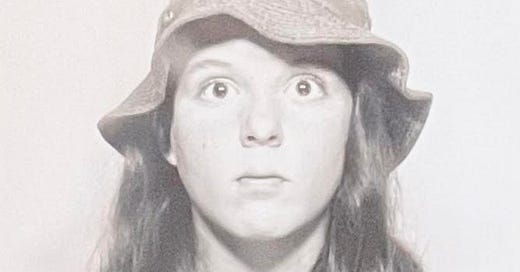Smarty-Pants
A major study identified me early on as an intellectually gifted child. But I was also just a dumb-ass kid....
Who you callin’ precocious?
When I was in seventh grade, way back in 1972, I was selected to join a small group of kids in my junior high school class who took the SAT — the same SAT that students four and five years ahead of us routinely sat for. I guess I did okay, because my score gained me admittance to the first cohort of students from across the country participating in something called the Study of Mathematically Precocious Youth.
The SMPY was founded on September 1, 1971 by Julian Stanley at Johns Hopkins University; the research continues under different leadership at Vanderbilt University. The idea was to complete a 50-year longitudinal study of five cohorts consisting of more than 5,000 intellectually talented students identified during the 25-year period from 1972 to 1997. According to the SMPY website,
The aim of this research is to develop a better understanding of the unique needs of intellectually precocious youth and the determinants of the contrasting developmental trajectories they display over the lifespan. The Study of Mathematically Precocious Youth is a bit of a misnomer, however, because verbally precocious youth have been included for longitudinal tracking, and participants are now all adults. Nevertheless, “SMPY” has been chosen to be retained to maintain consistency.
In its initial years, the SMPY used scores on just the Reasoning section of the SAT to select study participants; we had to get at least a 700 out of a possible 800 to make the grade.
This was kind of a big deal.
***
As with so many such things in my life, though, this achievement was downplayed at home. I remember my mother razzing me about that word “precocious,” to the point where instead of feeling proud or empowered by the experience, I felt vaguely embarrassed. I can imagine that other parents would have used this as an opportunity to find ways to support my intellectual development, but all I remember is the teasing.
I was also at a delicate age for such a thing to matter. I had just started my period, I was riddled with acne and thought I was fat, and all I wanted in this world was to marry David Cassidy and to be popular at school, which, when I think about it now, were directly conflicting goals.
So I tried my best to act like the SMPY was no big deal. That attitude persisted throughout my adolescence and even my early adulthood, as the SMPY sent extensive followup surveys every five, then ten years — and I chose to ignore them.
***
So, yeah, I was really good at math. But I had no idea how to make myself care about math, how to make math matter in the world beyond the classroom. I was also really good at reading, writing, spelling, grammar, and all things word-related. Those skills I could easily see using in the real world, a world in which I hoped to be a professional writer. Which, in fact, I did become. No math skills required!
My big brother Michael, now retired, had a decades-long career as an aerospace engineer, working on everything from the Stealth Bomber to the Space Shuttle. He knows how to use the language of the calculus to describe real-life phenomena; it is a fascinating thing to observe.
Me? Well I’m really really good at The New York Times Games: I ace the Spelling Bee, Wordle, Connections, Strands, and The Mini every single day, most days before I get out of bed in the morning.
As a card-carrying ENFP, I’m super skilled at connecting dots, solving problems, and imagining possibilities. I’m also an incredibly happy human being.
And, yes, in addition to raising two exceptional children and now enjoying the blessings of being grandparent to two more, I’ve managed to forge a fairly successful — and extremely rewarding — career in public relations and writing.
Do I sometimes wonder what I might have done with my life had I embraced my precociousness, mathematical and otherwise, in a bigger, more authentic way? Of course I do. But life is about making choice after choice after choice, and unless you’re dropping lots of breadcrumbs, there’s no retracing your steps. I firmly believe I am precisely where I am meant to be, just where the universe has decided to put me, and that I had to follow exactly the path I followed to get here.
I have, however, made one concession to my curiosity about what might have been. I just e-mailed the folks at SMPY to see if, having skipped all those earlier surveys, I might be allowed to participate in the last one for my cohort, to be administered when we’re 65, which I’ll be in December. I’ll let you know what they say!
Want to know more about the SMPY? Here’s a more-entertaining-than-it-needed-to-be 2016 documentary about the study.





As your friend and a fellow ENFP - I loved reading this! But it also made me appreciate my Mom even more!